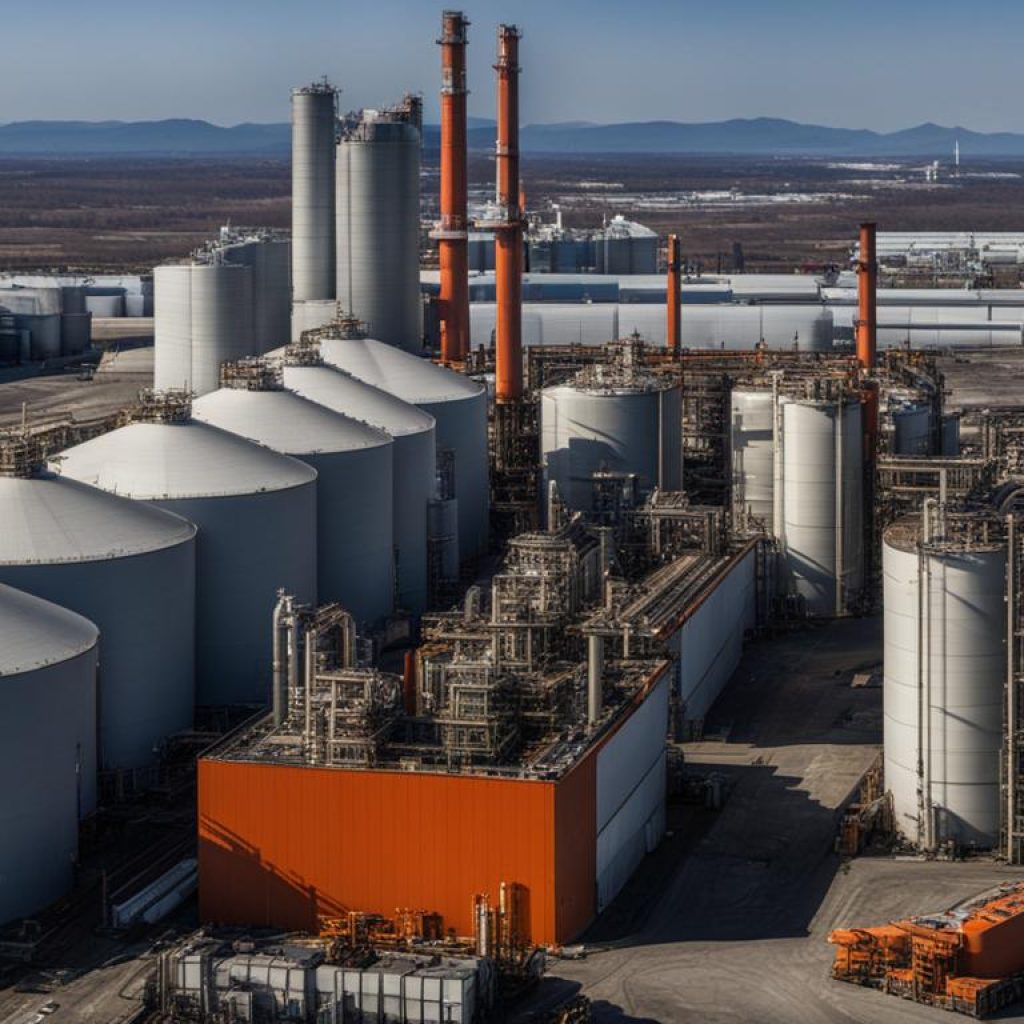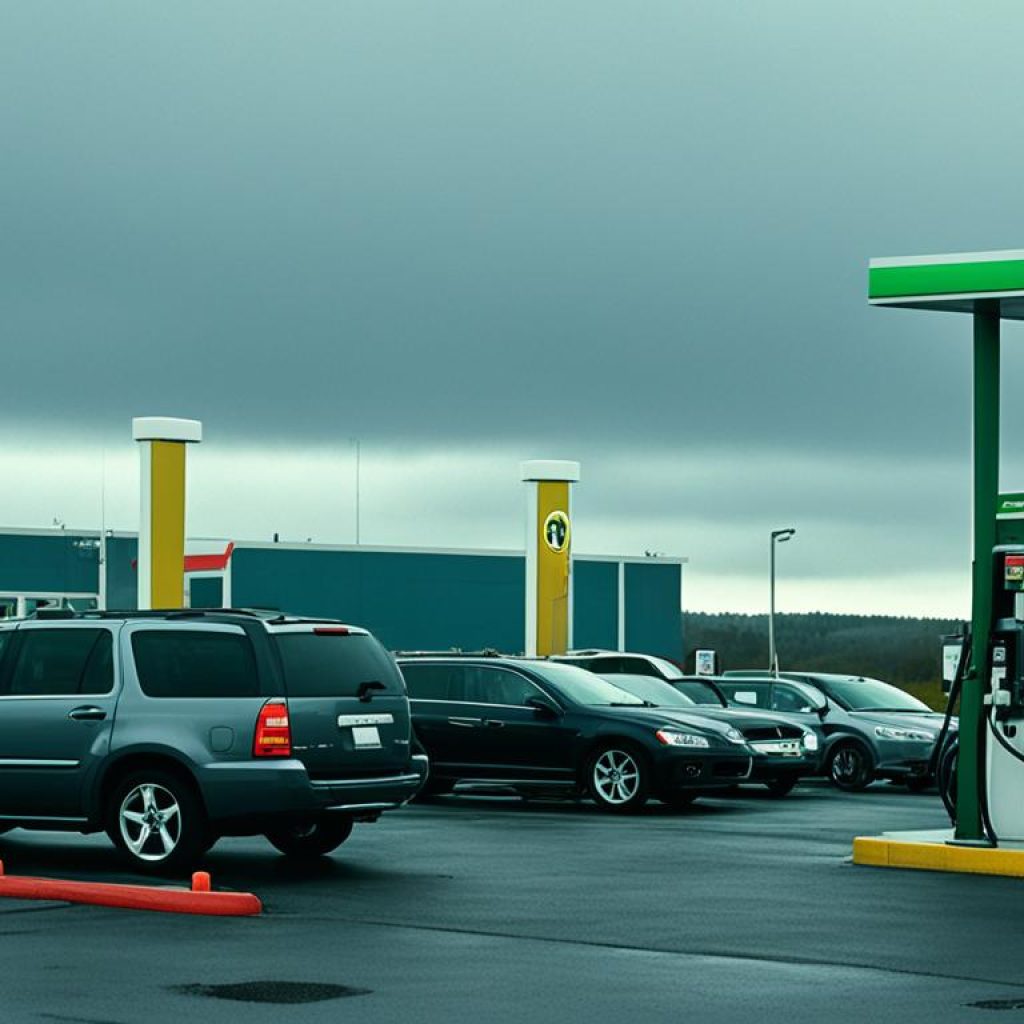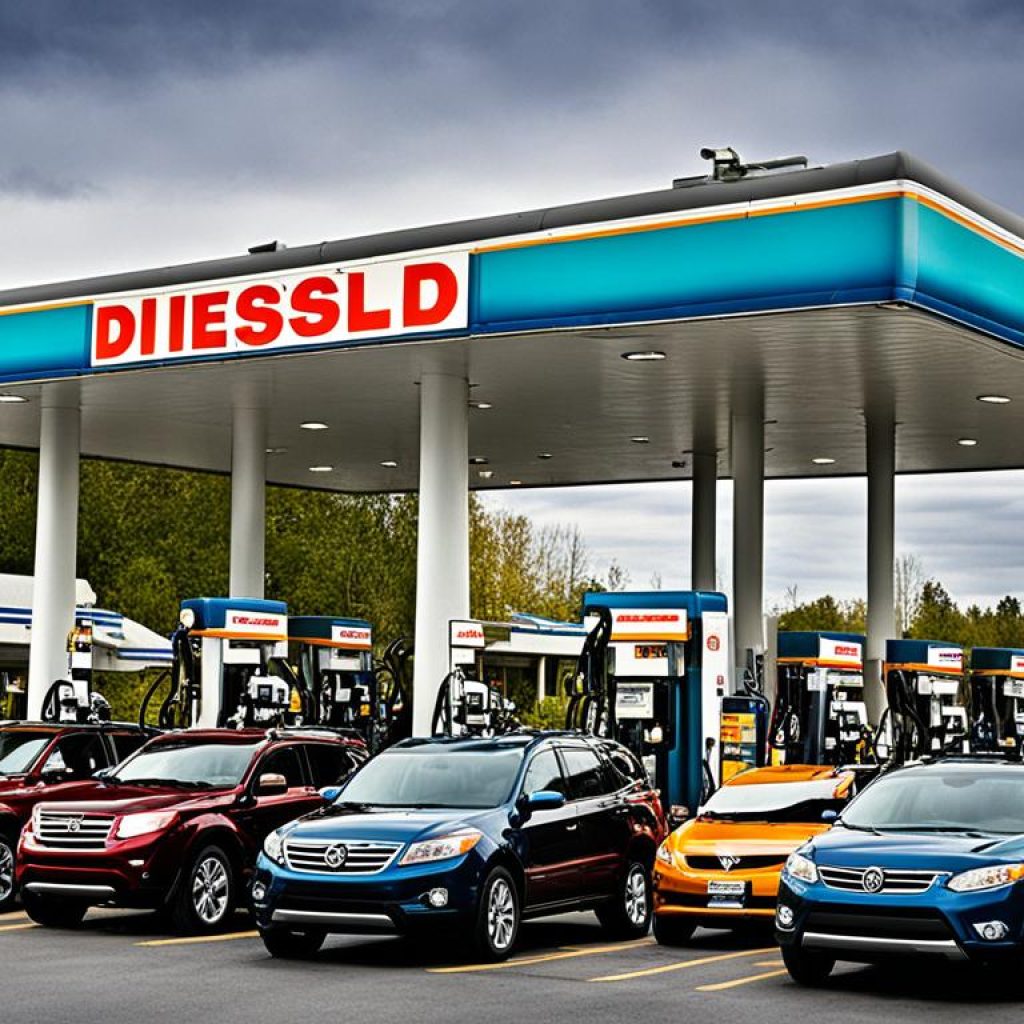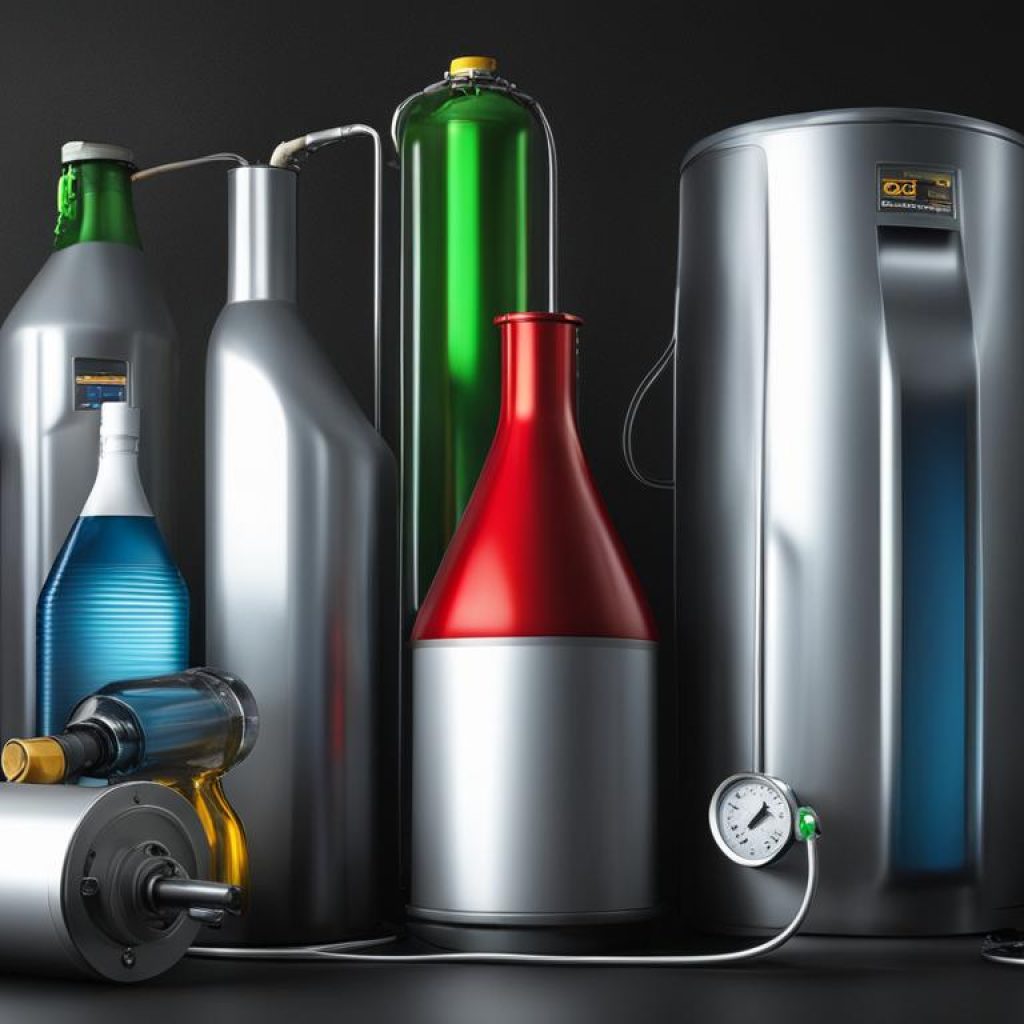The world’s transition towards renewable energy sources has sparked concerns about a potential diesel engine oil shortage in 2023. While the transportation industry continues to heavily rely on diesel fuel, fluctuating supply and demand dynamics, along with geopolitical conflicts and natural disasters, have impacted the availability of diesel engine oil.
In this article, we will delve into the causes of the diesel oil shortage and its impact on regular consumers in the US. We will examine the uncertainties surrounding the possibility of a shortage in 2023, where diesel engine oil comes from, and the major factors contributing to the shortage. Additionally, we’ll explore how the shortage will affect everyday consumers and look at the facts versus panic surrounding the situation. Finally, we’ll discuss alternative fuels and sustainable options for the future.
Key Takeaways:
- The transportation industry heavily relies on diesel fuel, raising concerns about a potential shortage of diesel engine oil in 2023.
- Fluctuating supply and demand dynamics, geopolitical conflicts, and natural disasters are major contributors to the diesel oil shortage.
- The shortage will have an impact on regular consumers, leading to increased fuel prices and disruptions in industries reliant on diesel.
- While rumors exist, the US maintains a continuous supply of diesel fuel, but prices may increase due to various factors.
- Exploring alternative fuels and moving towards renewable energy sources can help reduce dependence on diesel and ensure a more sustainable future.
Is There Going to be a Shortage of Diesel Engine Oil in 2023?
While rumors circulate about an ongoing diesel and derivative crisis, the possibility of a diesel engine oil shortage in 2023 remains uncertain. The global oil industry has experienced fluctuating supply and demand dynamics, coupled with production cuts by major oil-producing nations, which have impacted the availability of diesel engine oil. However, it is essential to consider that industry insiders have successfully adapted to similar challenges in the past.
With the global oil industry facing various challenges, including geopolitical conflicts and the shift towards renewable energy sources, it is no surprise that concerns about diesel engine oil shortage have emerged. However, the severity of the shortage and its impact on consumers are yet to be fully understood.
To explore the possibility of a diesel engine oil shortage in 2023, it is necessary to analyze the current state of the global oil industry. Fluctuating supply and demand dynamics play a significant role in determining the availability of diesel engine oil. These dynamics are influenced by various factors, including geopolitical tensions, changes in fuel consumption patterns, and economic fluctuations.
Production cuts by major oil-producing nations can also contribute to potential shortages. When countries reduce their oil production, it affects the overall supply of petroleum products, including diesel engine oil. Additionally, unforeseen events such as natural disasters can disrupt production and distribution processes, further impacting the availability of diesel engine oil.
However, it is important to remember that the oil industry has faced and overcome similar challenges in the past. Adaptability and resilience are prominent traits of this industry, which has navigated through geopolitical tensions, economic downturns, and supply disruptions. Industry insiders have implemented strategies to mitigate the impact of these challenges and ensure a steady supply of essential fuels.
While the possibility of a diesel engine oil shortage in 2023 cannot be dismissed entirely, it is crucial to approach the topic with a balanced perspective. Monitor the developments in the global oil industry and stay informed about potential disruptions that may affect the availability of diesel engine oil.

Where Does Diesel Engine Oil Come From?
Diesel engine oil plays a crucial role in the functioning and performance of diesel-powered vehicles. But have you ever wondered where this essential lubricant originates from? Let’s explore the fascinating journey of diesel engine oil, starting from its origin to the major suppliers in the United States.
Origin of Diesel Engine Oil:
Diesel engine oil is derived from crude oil, a natural resource found in oil reservoirs around the world. Crude oil is a complex mixture of hydrocarbons, which undergoes a refining process to extract various valuable products, including diesel engine oil.
The Diesel Refining Process:
Once the crude oil is extracted, it is transported to refineries where it undergoes several crucial processes. These processes include distillation, cracking, and treating. Through distillation, the crude oil is heated and separated into different fractions based on their boiling points. The fraction suitable for diesel fuel is then further processed to create high-quality diesel engine oil.
Major Suppliers of Diesel Engine Oil:
In the United States, several major suppliers and producers ensure a steady supply of diesel engine oil. These companies have extensive operations and a strong presence in the market. Some of the leading suppliers of diesel engine oil in the US include ExxonMobil, Chevron, and Valero Energy.
Diesel Engine Oil Suppliers in the United States
| Supplier | Market Share |
|---|---|
| ExxonMobil | 30% |
| Chevron | 20% |
| Valero Energy | 15% |
| Others | 35% |

These suppliers ensure a steady and reliable flow of diesel engine oil to meet the demand of consumers and various industries dependent on diesel fuel.
What are the Major Causes of Diesel Oil Shortage?
Several factors can contribute to a diesel oil shortage. Geopolitical conflicts, such as the Ukraine War, can disrupt the global supply chain of diesel oil. The COVID-19 pandemic has also had a significant impact on the oil industry, leading to decreased production and storage. Refinery maintenance and upgrades, as well as natural disasters like hurricanes and floods, can further disrupt the distribution and supply of diesel oil.
The ongoing geopolitical conflicts around the world, particularly the Ukraine War, have the potential to significantly impact the global supply chain of diesel oil. These conflicts can lead to disruptions in oil transportation routes, making it difficult for diesel oil to reach its intended destinations. As tensions rise and trade routes become unstable, the availability of diesel oil can be severely affected.
The COVID-19 pandemic has brought about a multitude of challenges for the oil industry. Lockdowns, travel restrictions, and reduced economic activities have resulted in decreased demand for diesel fuel. As a result, oil producers have scaled back their production levels, leading to a decline in available diesel oil supply. Moreover, the pandemic has also caused delays in refinery maintenance, further impacting the production and distribution process.
Refinery maintenance and upgrades are essential for ensuring the smooth operation of oil refineries. However, these activities can temporarily disrupt the supply of diesel oil. During maintenance periods, production may be reduced or halted altogether, leading to a shortage in the market. Additionally, unexpected issues or delays during the maintenance process can exacerbate the impact on diesel oil supply.
Natural disasters, such as hurricanes and floods, can have widespread effects on various industries, including the oil industry. When a natural disaster strikes, refineries and transportation infrastructure can be damaged or disrupted, affecting the production and distribution of diesel oil. These events can lead to temporary shortages in specific regions or even impact the overall supply chain.
In summary, geopolitical conflicts, the post-COVID scenario, refinery maintenance, and natural disasters are some of the major causes of a diesel oil shortage. These factors can disrupt the global supply chain, decrease production and storage, and impact the distribution process. It is important for industry stakeholders to proactively address these challenges to ensure a stable and reliable supply of diesel oil.
How Diesel Shortage Will Impact a Regular Consumer in the US?
The ongoing diesel shortage will have a significant impact on regular consumers in the US. With the decrease in the availability of diesel fuel, there will be a noticeable increase in fuel prices at the pump.
This increase in fuel prices will directly affect the cost of operating diesel-powered vehicles, including cars and trucks. Regular consumers will have to bear the brunt of higher fuel expenses, which can have a ripple effect on their daily lives and budgets. This can potentially result in reduced disposable income and limited spending capacity for other essential needs.
Moreover, industries heavily reliant on diesel fuel, such as construction and agriculture, will also face disruptions. Limited access to diesel fuel may lead to delays in construction projects and agricultural activities. The increase in costs associated with obtaining diesel fuel may further burden these industries, potentially leading to higher prices for goods and services.

It is important to recognize the broad impact of the diesel shortage extending beyond individual consumers. The disruptions in industries will have far-reaching consequences for the overall economy.
Diesel Shortage: The Facts vs. Panic
Despite sensationalized claims of an extreme diesel shortage, the United States maintains a continuous supply of diesel fuel. The country’s reserves are consistently replenished through ongoing production and imports. As of July 2023, there were 118.2 million barrels of distillate fuel oil in stock, indicating a healthy inventory. However, it is important to note that the current supply is lower compared to previous years due to various factors, leading to potential price increases in diesel fuel.
False claims about a severe diesel shortage have caused unnecessary panic and concern among consumers. These claims often stem from misinformation and a lack of understanding about the diesel industry’s resilience and supply chain management. While challenges exist, industry experts are actively working to optimize production, distribution, and import processes to ensure a steady and accessible supply of diesel fuel.
Understanding Diesel Reserves in the United States
The United States holds strategic reserves of diesel fuel to safeguard against supply disruptions and emergencies. These reserves are managed by the government and play a crucial role in stabilizing the market during times of increased demand or unforeseen events.
Furthermore, the US has a well-established infrastructure and network of refineries that contribute to the production of diesel fuel. This allows for greater flexibility and adaptability in meeting consumer needs, even in the face of challenges such as refinery maintenance or natural disasters.
It is important for consumers to be informed about the facts and not succumb to panic-inducing rumors. The continuous supply of diesel fuel, replenished by ongoing production and imports, ensures that there is no cause for alarm.
| Fact or Myth | Explanation |
|---|---|
| Myth: Extreme diesel shortage | The claim of an extreme diesel shortage is misleading and exaggerated. |
| Fact: Continuous supply | The US maintains a continuous supply of diesel fuel through ongoing production and imports. |
| Fact: Diesel reserves | The United States has strategic reserves of diesel fuel to ensure stability and mitigate supply disruptions. |
| Myth: Impending crisis | The diesel industry has faced challenges in the past and has demonstrated resilience in managing supply chains. |
| Fact: Industry adaptation | Industry insiders and experts are actively working to optimize production and distribution processes. |
Understanding the facts about diesel reserves and the ongoing efforts to maintain a steady supply is crucial in dispelling unnecessary panic. Being well-informed empowers consumers to make rational decisions amid fluctuating market conditions.

By separating facts from panic-inducing claims, consumers can navigate the diesel market with confidence and trust that the industry is equipped to meet their fuel needs.
Alternatives to Diesel Fuel
In light of concerns about the diesel fuel shortage and its environmental impact, it is important to explore alternative fuels that can help reduce dependence on traditional diesel. Switching to these alternatives not only mitigates the impact of the shortage but also contributes to a cleaner and more sustainable future.
Biodiesel
Biodiesel is a renewable fuel made from vegetable oils, animal fats, or recycled cooking oil. It can be used in diesel engines without any modifications and has lower greenhouse gas emissions compared to traditional diesel.
Renewable Diesel
Renewable diesel, also known as green diesel, is another viable alternative to traditional diesel fuel. It is produced from renewable feedstocks such as vegetable oils, animal fats, and greases. Renewable diesel provides similar performance to conventional diesel while reducing emissions.
Electric Vehicles (EVs)
Electric vehicles powered by electricity have gained significant popularity in recent years. They offer zero tailpipe emissions and can be charged using renewable energy sources, making them an eco-friendly alternative to diesel-powered vehicles.
Ethanol
Ethanol is a renewable fuel that can be derived from biomass sources like corn, sugarcane, or switchgrass. It can be blended with gasoline or used in flex-fuel vehicles, reducing both greenhouse gas emissions and petroleum consumption.
Hydrogen
Hydrogen fuel cells convert hydrogen gas into electricity, powering vehicles without emitting harmful pollutants. Hydrogen is considered a promising alternative fuel for heavy-duty vehicles and public transportation.
Natural Gas
Natural gas is a cleaner-burning fuel compared to diesel and gasoline. Vehicles can be converted to run on compressed natural gas (CNG) or liquefied natural gas (LNG), offering lower emissions and potentially lower fuel costs.
Propane
Propane, also known as liquefied petroleum gas (LPG), is a byproduct of natural gas processing and petroleum refining. It can be used as a transportation fuel, providing lower carbon emissions and potentially reducing operating costs.
Exploring these alternative fuels can diversify the energy mix in the transportation sector and help reduce the environmental impact associated with diesel fuel. Adopting these cleaner and more sustainable options is crucial for a greener future.

Conclusion
While the possibility of a diesel engine oil shortage in 2023 raises concerns, industry insiders believe that the supply will be able to meet customer needs. The fluctuating dynamics of increased demand, global supply chains, and external events can influence the availability of diesel oil. However, it is crucial to continue exploring alternative fuels and transitioning towards renewable energy sources for a more sustainable future.
The future of diesel oil relies on finding innovative solutions to address the challenges posed by the shortage. Investing in research and development of renewable energy sources, such as biodiesel and renewable diesel, can alleviate the dependence on traditional diesel fuel. Embracing electric vehicles and other clean technologies will contribute to reducing CO2 emissions and promoting environmental sustainability.
While the diesel motor oil shortage may cause short-term disruptions, it also presents an opportunity to reimagine our energy landscape. By embracing alternative fuels and advancements in technology, we can shape a future where the transportation industry becomes more sustainable and eco-friendly. It is essential for stakeholders, including governments, industries, and consumers, to collaborate and drive this transition towards a cleaner and greener future.
FAQ
Is there going to be a shortage of diesel engine oil in 2023?
The possibility of a diesel engine oil shortage in 2023 is uncertain, but it is affected by fluctuating supply and demand dynamics in the global oil industry, as well as production cuts by major oil-producing nations.
Where does diesel engine oil come from?
Diesel engine oil is derived from crude oil, which is extracted from oil reservoirs around the world. It undergoes processes like distillation, cracking, and treating in refineries to create high-quality diesel engine oil.
What are the major causes of diesel oil shortage?
Several factors can contribute to a diesel oil shortage, including geopolitical conflicts, such as the Ukraine War, the impact of the COVID-19 pandemic on the oil industry, refinery maintenance and upgrades, and natural disasters like hurricanes and floods.
How will diesel shortage impact a regular consumer in the US?
The diesel shortage will lead to an increase in fuel prices, which will affect the cost of operating diesel-powered vehicles for regular consumers. Industries reliant on diesel fuel may also experience delays and increased costs, which can result in higher prices for goods across different sectors.
What are the facts versus panic about the diesel shortage?
While there have been false claims about an extreme diesel shortage, the US has a continuous supply of diesel fuel. As of July 2023, there were 118.2 million barrels of distillate fuel oil in stock. However, the supply is lower than previous years, and the price of diesel fuel may increase due to various factors.
What are the alternatives to diesel fuel?
Alternatives to traditional diesel fuel include biodiesel, renewable diesel, ethanol, electricity (including electric vehicles), hydrogen, natural gas, and propane. Switching to these fuels can help reduce dependence on diesel and contribute to a cleaner and more sustainable future.
What is the future of diesel oil?
While the possibility of a diesel engine oil shortage raises concerns, industry insiders believe that the supply will meet customer needs. However, it is important to continue exploring alternative fuels and transitioning towards renewable energy sources for a more sustainable future.

